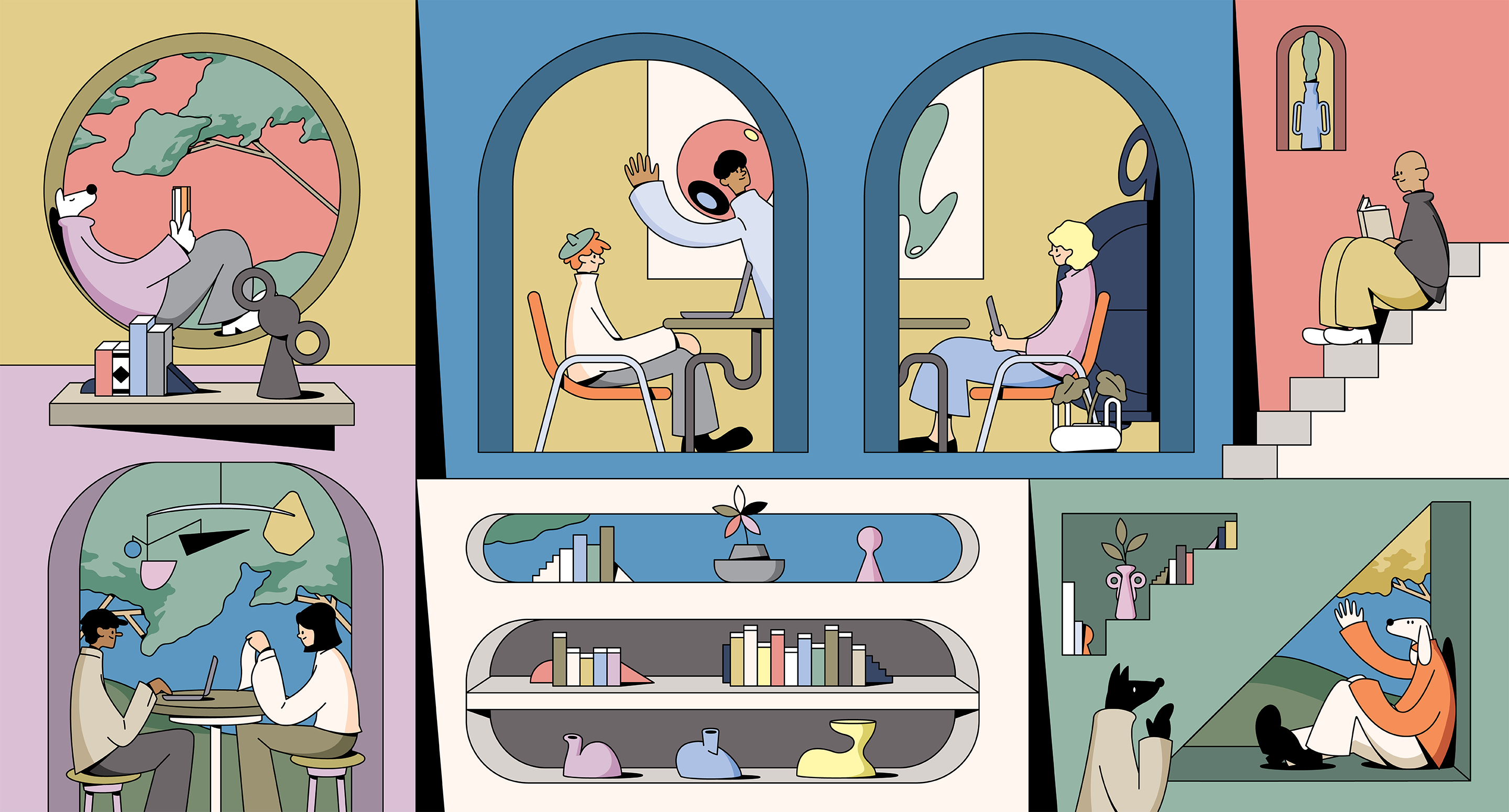The Radical Power of Listening in Times of Crisis

Texting a student who is not in his class just to ask how they’re doing was a first for Professor Tobin Terry. The English professor at Lakeland Community College is part of the Enlightened Navigator Program, a new effort to support students during the coronavirus crisis.
Tobin Terry: Hi, this is Professor Terry from Lakeland. I’m just checking in to see if I can help you with anything. I hope you are well!
Erica: I’ve been fine staying safe & healthy. After this semester I was supposed to apply for the RNs program since I’m finishing up stats. Can’t reach out to counseling. So maybe you can tell me how to go about that.
Tobin: Counseling is still available! You can call 440-525-7200 or email counseling@lakelandcc.edu. They’ve been working remotely either by video chat or phone call. I can hel set you up! Sorry it’s taken me awhile to get back to you, my kids are pretty much sick of each other and fight like stray cats
Erica: Please schedule me a video chat or meeting with a counselor this coming Monday or any day next week please & thank you! 😊😊
Tobin: You got it! I’ll have the details in your email!
“My approach is to just be myself—typos and all—but I'm ready with the info when the student needs it,” says Professor Terry. “Mostly, it feels like the students are just glad to hear from someone. The way I see it, if we're helping at least one student get through this crisis, it's all worth it.”
This level of student support might seem unusual, but at Lakeland Community College, it underpins everything the leadership, staff, and faculty do. For the past four years, president Morris Beverage and his team have been working with IDEO to become radically student-centered. So far, this has resulted in a more timely financial aid process, dedicated maker space, collaborative community of teachers from across the district, and improved first-year experience courses. Their aspiration is to drive resilience both within the organization and local educational system.
Many organizations are currently navigating unprecedented levels of complexity, and can’t help but feel paralyzed or wish that things will return to normal in a few months. It’s natural, when circumstances are uncertain, to delay action or downplay the implications. But what if, instead of waiting or planning for the return of “business as usual,” we used this time to redesign our systems for the better? Rather than constantly making small tweaks, we rebuild comprehensively.
Lakeland Community College is leaning into this moment, not only meeting students’ needs in a proactive way, but also discovering opportunities to redesign their student experience altogether. The following design-led strategies from Lakeland Community College lend inspiration to leaders in a moment when we sorely need it.
When their family of six is sharing a single computer with spotty Internet access, is that student going to be able to finish an online assignment on time? Leaders at the College knew that their decisions could not be made in a vacuum when they began the transition to online learning. Student engagement is a strong predictor of student retention and success, just as customer and employee engagement drives retention in other industries. But to meaningfully engage with and support students, leaders first needed to understand how students were experiencing the crisis. In addition to meeting with employees who closely interact with students, the Lakeland team connected directly with students and looked to other industries to gain deeper understanding and empathy for varied individual experiences.
Years ago, Beverage stumbled across a study on the “Enlightened Witness” care provider approach developed by Kaiser Permanente of California. Rather than primarily asking patients about their current symptoms, “enlightened” providers also inquire about patients’ lives beyond their health condition, including their current situations, past experiences, and families. If a patient says that a parent struggled with alcoholism, for example, the provider seeks to understand how this affected the person later in life. Research revealed that this care model led to measurable positive outcomes, including a reduction in doctor office visits.
The approach inspired Beverage to send out an email and video message to all students, providing them with his personal email address and inviting them to reach out to him directly. Based on dozens of responses, the team prototyped a student support program modeled after the “Enlightened Witness” program over the course of just five days—an unprecedented pace for a sector notorious for regulation and bureaucracy.
We are building this as we go and there will be bumps, but good education can’t wait. MORRIS BEVERAGE, PRESIDENT OF LAKELAND COMMUNITY COLLEGE
Beverage and a small crisis response team made up of employees across Lakeland began prototyping what they called the “Enlightened Navigator” Program. (The term “navigator” originated from an existing role some Lakeland employees hold, which is dedicated to helping students navigate the college’s resources.) This core group hypothesized that by letting students know that they are cared for, Lakeland employees could gain empathy for their challenges, eliminate barriers, and better design how they serve them.
Hoping to enlist volunteers from Lakeland faculty and staff, Beverage sent out an email message and video asking them to participate in the program. This led to over 130 Lakeland employees signing up to be navigators and providing consistent personal outreach to a group of students. The program was designed to enable continuous feedback between students, navigators, and the crisis response team, so they could quickly respond and adapt as the student’s situation changed from week to week.
When Tracy Shook, Director of Marketing & Communications, reached out to one of her students, she discovered that the student was homeless. Somehow, despite everything, the student is keeping up with her online course load. Shook checks in with her regularly to see how she can offer help amid the student’s shifting and unusual circumstances, whether searching for shelter, trying to feed her family, or finding reliable Internet access. Shook recognizes that education remains critical, even in the midst of a life-or-death global crisis. For many students, reaching their goals and creating a better future for themselves is also key to survival.
The program’s design offers navigators like Shook the chance to interact with students for the first time, further facilitating an institutional shift towards student-centeredness. To support navigators, the crisis response team designed a playbook with sample questions to ask students, tactical FAQs, and other information navigators might need. Equipped with this resource and leadership support, navigators feel more empowered and confident to take action and provide meaningful care to students.
For other navigators like Gloria Lane who manages the women’s center, the program is an opportunity to develop even more empathy and admiration for Lakeland students. Lane is currently supporting a student who works as an aide at the nearby Cleveland Clinic. Through the early hours of the morning, the student sits with elderly, confused, or suicidal COVID-19 patients. After these demanding, emotional shifts, the student, with encouragement from Lane, pushes herself to flip the switch and study for an upcoming math exam.
Another navigator recently spent an hour on the phone with a student who said he felt lost without in-person classes and had been avoiding a big project on the stock market. “He had lost confidence and nearly shut down,” says Cindy Simerly, a navigator and business management professor. “But after helping him navigate the computer software and giving him appropriate tips for how to approach the project, he is back on track and believes he can do it. He kept apologizing for the time it took, but also kept thanking me.”
Like many organizations, colleges tend to delegate this type of outreach to one dedicated team. The Enlightened Navigator Program brought together employees from across the college—leadership, faculty, deans, financial aid associates, marketing team members, women’s center staff, and others—to achieve the shared goal of supporting students. This design enabled the collaboration, mobilization, and distributed leadership needed to spark a student-centered mindset throughout the college.
We’ve seen how this collaborative approach can benefit other organizations: At Ford, for example, teams from human resources, legal, and manufacturing are currently working together and focusing on people as they prioritize worker protection and safety when reopening their factories.
Every student should have a somebody, especially in the current state of the world. CHRISTINA CORSI, ASSOCIATE DIRECTOR OF STRATEGIC INITIATIVES AND CAMPUS ENGAGEMENT
So far, Lakeland has actively engaged and supported over 600 students. But their work doesn’t stop at graduation. “The core group realized that we should continue this [program] into the fall,” says Christina Corsi, Associate Director of Strategic Initiatives and Campus Engagement. Navigators are focused on supporting their students through the summer and into the fall, doing everything they can to help students make it to day one of fall semester classes. The program has been so successful that Lakeland is planning to integrate aspects of it into the new student orientation. For example, employees will now proactively reach out to new students with personalized messages of support as a part of orientation.
Lakeland’s four-year journey to becoming more student-centered has made them better able to listen, experiment, and quickly adapt to whatever comes their way. This is the type of flexibility and resiliency required to not only respond to a pandemic, but to inspire the redesign of a dated system that’s currently creating barriers for enrollment and degree completion.
“Through this program, we designed and lived in the kind of organization that we want to forever be: collaborative, empathetic, and experimental—all the things that student-centered higher education institutions should be,” says Leah Hartmann, Executive Assistant to the President and Special Projects Lead. “We saw a glimmer of what’s possible and now know it can be done.”
Illustration by Kim Salt
Words and art

Subscribe

.svg)









